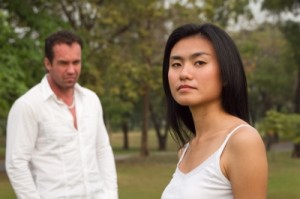.
I was six years old and in first grade when I first loved a boy in my class. I wrote him a letter telling him I intended to marry him! Luckily, the note was found by my Mom who intercepted its delivery. She also assured me that I had quite a long stretch of time ahead of me yet for my love pursuits. I’m not so sure that I wanted to pursue this six-year-old boy, but later in life, I did pursue the love of my life, and luckily, he was worth his weight in gold.
.
Once again, I was lucky. Or maybe somewhat wiser to make the right decision at the right time for the right person. But many women who fall in love continue their relationship even when their partners in loving express their attentions by behaviors that demean rather than elevate them. This is the case of toxic relationships. Toxic relationships suffocate and injure, where as love nurtures and honors. And many women know that theirs is toxic, yet stay in it.
.
We don’t hear of men in toxic relationships so much. For one thing, traditionally, and even at this day and age, power is attributed to men — physical power, financial power, and almost genetically-coded power that comes with being the male of our species. And when one person holds power over another, human nature is such that, it often reflects as shades of self-centerdness, if not manipulation or domination.
.
Many women have become much more aware, and walk proud as they negotiate the power game, refusing to settle for the short end of the stick. And in the same breath, we should state that men have come a long way from their traditional roles and have learned the art of being an equal partner.
.
Meanwhile let’s not sugar coat the violence against women: five million women in the US are reported to be physically abused every year. Note that these are the reported cases only, and do not include other forms of toxic relationships where women are subjected to emotional and psychological abuse. And how many of the toxic relationships in which the woman partner is made to feel inferior — explicitly as by abusive language, or implicitly by irony and put downs — could possibly get reported?
.
I feel this is an individual issue and the best time for a woman’s (proactive) decision is when the writing is on the wall; that is, before marriage or commitment, where possible. If a woman is not being respected and honored for her personhood prior to a commitment, chances are slim that she will be after tying the knot. Love’s eyes may be blind, but women are wise, women are intuitive and women can sense a threat to their own well being and to the welfare of their loved ones.
.
Sometimes this takes a huge resolve and immense strength. When women cannot be protective of themselves from toxic relationships, I hope they have the courage to question themselves as to why they put up with it, and seek counseling.
.
Below, I have put down some basic questions to determine the strength of a relationship and how nurturing and honoring it may be. I invite you to rate your relationship. You can quit while you are ahead, or give him your all for a very long time. As to the middle ground … such is our force of belief in love and positive outcomes!
.
Rate your relationship:
Strongly agree (5) Agree ( 4) No opinion (3) Disagree (2) Strongly disagree (1)
- He makes me feel special, valued and unique.
- He always treats me with respect and dignity.
- My family and friends think we are a good match.
- His family and friends are welcoming and warm towards me.
- He likes children and animals.
- He respects my time for being by myself, or with my friends/other hobbies.
- He shares life chores like cooking and cleaning.
- We share many interests and activities together.
- He is a trustworthy person who would not take advantage of me.
- I consider him to be (one of) my best friend(s).
What is your total score? What do you think your score means?
.
About the Author
Dr. Ayshe Talay-Ongan is a psychologist and an emeritus academic. Her life’s work has been one of university teaching, research and providing therapy to children and families. As a developmental psychologist and university professor, she has written three textbooks and numerous scholarly articles. Talay-Ongan is Turkish by birth, American by citizenship and currently lives in Sydney, Australia, and sees herself as a true Citizen of the World. She is married with two grown daughters and their cat, Simba.
www.turquoise-alovestory.com.au www.facebook.com/turquoisealovestory
.

